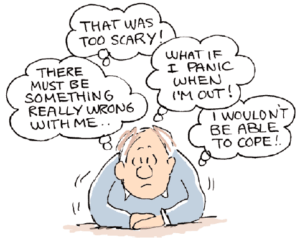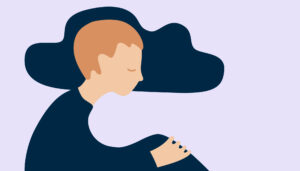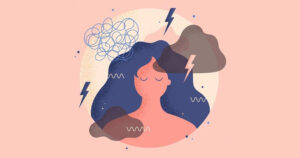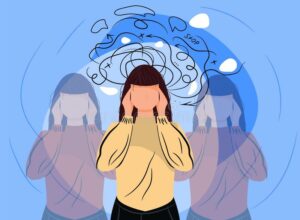Anticipatory anxiety is a type of anxiety that is experienced before an event or situation that is feared. It can be incredibly debilitating and make it difficult to live a normal life. If you are struggling with anticipatory anxiety, don’t worry – you are not alone. In this blog post, we will discuss what anticipatory anxiety is, the symptoms, and how you can deal with it.
Contents
Defining Anticipatory Anxiety
Anticipatory anxiety is more than just feeling a little bit nervous before an event. It is a type of anxiety that is characterized by intense fear and dread. People with anticipatory anxiety may avoid the situations that trigger their anxiety, which can lead to significant disruptions in their life.
It is important to note that anticipatory anxiety is different from general anxiety. General anxiety is a feeling of unease that can be triggered by many different things. Anticipatory anxiety is specific to a feared event or situation.
Anticipation anxiety can be caused by a variety of things. Some people may have anxiety about public speaking, while others may dread going to the dentist. It is important to remember that everyone experiences anxiety differently and there is no “right” or “wrong” way to feel anxious.
When Does Anticipatory Anxiety Occur?
Anticipatory anxiety can occur at any time. However, it is most common in the lead-up to a feared event. This can include:
- The night before an important exam
- Few days before a big presentation at work
- The week leading up to a surgery
- A month before moving to a new city
- An upcoming social event
- Meeting someone for the first time
- Job interview
- A public Performance
- Any situation that you find stressful or anxiety-provoking
It is also common for people with anticipatory anxiety to obsessively think about their fear. This can make it difficult to concentrate on anything else and can lead to significant distress.
As you can see, anticipatory anxiety can be triggered by a variety of different things. It is important to remember that everyone experiences anxiety differently. What may cause one person to feel anxious may not have the same effect on another person.
Types Of Anticipatory Anxiety

There are three types of anticipatory anxiety:
Situational
This type of anticipatory anxiety is triggered by a specific event or situation, such as an upcoming test, job interview, or public speaking engagement. It can be difficult to avoid the trigger, which can make situational anticipatory anxiety very debilitating. It can take form in the form of performance anxiety, which is common among athletes, musicians, and actors.
Imaginal
This type of anticipatory anxiety is characterized by intense fear about a future event that may or may not happen. It is often based on irrational thoughts and can be difficult to control. People with imaginal anticipatory anxiety may obsessively think about worst-case scenarios and what could go wrong. This can lead to significant distress and make it difficult to live a normal life. This can occur in the form of anxiety about future events, such as an upcoming surgery.
Generalized
This type of anticipatory anxiety is not attached to any specific event or situation. It is more general and can be triggered by many different things. People with generalized anticipatory anxiety may feel anxious all the time, even when there is no apparent trigger. This is common among people with anxiety disorders, such as generalized anxiety disorder (GAD) and PTSD, among others.
An individual can have either one or a combination of these sub-types of this anxiety disorder.
Symptoms
The symptoms of anticipatory anxiety can vary from person to person. Some common symptoms include:
- Intense fear or dread
- Avoidance of feared situations
- Racing heart
- Sweating
- Shaking or trembling
- Shortness of breath
- Nausea or stomach upset
- Feeling dizzy or lightheaded
- Feeling restless or on edge
- Difficulty concentrating
- Irritability
- Muscle tension
- Fatigue
- Difficulty sleeping
Symptoms may vary in intensity, frequency, and effects, depending upon the individual’s circumstances and context.
Causes Of Anticipatory Anxiety

There are a variety of different things that can cause anticipatory anxiety. Some common causes include:
Past traumatic event: Trauma can cause people to feel anxious about future events. This is common among people with PTSD.
Family history of anxiety: If you have a family member who suffers from anxiety, you may be more likely to experience it yourself.
Major life change: Big changes, such as starting a new job or going to college, can trigger anticipatory anxiety.
Stressful life events: Things like divorce, the death of a loved one, or financial problems can lead to anticipatory anxiety.
Anxiety disorders: People with conditions like GAD or social anxiety disorder (SAD) are more likely to experience anticipatory anxiety.
An underlying medical condition, such as a thyroid disorder: These can sometimes cause anxiety.
Substance abuse: Substance abuse and the effects of intaking intoxicated materials can lead to anxiety and make it difficult to cope with stressful situations.
Personality traits, such as perfectionism or being a “worrywart”: If you tend to worry a lot or are a perfectionist, you may be more likely to experience anticipatory anxiety.
It is important to note that not everyone who experiences anxiety will have the same triggers. It is also important to remember that you cannot always control what causes your anxiety. However, there are some things that you can do to help manage your symptoms and reduce your anxiety.
Effects On Everyday Life

The effects of anticipatory anxiety can vary depending on the individual. For some, the symptoms may be mild and only occur in specific situations. However, for others, the symptoms can be severe and debilitating, making it difficult to live a normal life. The following are some common ways in which anticipatory anxiety can affect your life:
Work or school: Anticipatory anxiety can make it difficult to concentrate at work or school. It may also cause you to miss days or perform poorly.
Relationships: Anticipatory anxiety can strain your relationships with family, friends, and romantic partners. It may cause you to withdraw from social activities or avoid certain people or situations.
Daily activities: Simple tasks that you once enjoyed, such as going to the grocery store or taking a walk, may become difficult or impossible to do.
New opportunities: You may miss out on new opportunities, such as a job or promotion, because of your anxiety.
Reduced socialization: You may find yourself isolating yourself from others out of fear or embarrassment.
Health: The physical symptoms of anticipatory anxiety can take a toll on your overall health. Additionally, the stress of living with anticipatory anxiety can contribute to other health problems, such as heart disease and gastrointestinal issues.
Treatment

There are a variety of different treatment options available for anticipatory anxiety. The best course of treatment will vary depending on the individual and the severity of their symptoms. Some common treatments include:
Medication
Medication can be used to help manage the symptoms of anxiety. It helps by reducing the number of stress hormones in the body and by increasing the level of serotonin, a chemical that helps regulate mood. The most common type of medications for anxiety include:
Selective serotonin reuptake inhibitors (SSRIs): SSRIs are the most commonly prescribed type of medication for anxiety. They work by increasing the level of serotonin in the brain.
Serotonin and norepinephrine reuptake inhibitors (SNRIs): SNRIs are similar to SSRIs, but they also increase the level of norepinephrine in the brain. This can help to improve mood and energy levels.
Benzodiazepines: Benzodiazepines are a type of sedative that can be used for short-term relief from anxiety. They work by calming the nervous system and can provide fast relief from symptoms.
It is important to be in touch with a professional and licensed healthcare provider for a legal and valid prescription and also for monitoring the side effects and benefits and effects of the medication on the individual’s disorders.
Therapy
Therapy can help you learn how to cope with your anxiety. It can also teach you healthy ways to deal with stress and change.
Cognitive-behavioral therapy (CBT): CBT is a type of therapy that helps to change the way you think and behave. It can be used to help you manage your anxiety by teaching you healthy coping skills and ways to reduce stress.
Exposure therapy: Exposure therapy is a type of CBT that involves gradually exposing yourself to the things that make you anxious. This can help you to learn how to cope with your anxiety and eventually overcome it.
Support groups: Support groups provide a place for people with similar experiences to share their stories and offer support to one another. They can be an effective way to cope with anxiety and connect with others who understand what you are going through.
Self Help Tips
There are also a number of things you can do on your own to help manage your anxiety. Some self-help tips for anticipatory anxiety include:
Identify your triggers: As we mentioned before, not everyone has the same triggers for their anxiety. By taking the time to identify what causes your anxiety, you can be better prepared to manage it.
Challenge your negative thoughts: If you find yourself obsessing over worst-case scenarios, challenge those thoughts. Ask yourself, “What is the evidence for and against this thought?”
Deep breathing exercises: Deep breathing exercises can help to calm your mind and body. They are a simple and effective way to reduce anxiety at the moment.
Reduce stress: Reducing stress in your life can help to reduce your anxiety. You can do this by learning healthy coping skills, such as relaxation techniques or exercise. You may
Relaxation techniques: Relaxation techniques, such as progressive muscle relaxation, can help to reduce stress and promote feelings of calmness.
Create a support system: Having a supportive network of family and friends can make a world of difference when dealing with anxiety. These people can provide you with emotional support and practical assistance when needed.
Exercise: Exercise can help to reduce stress and improve mood. It is also a great way to get out of your head and focus on something else.
Eat a healthy diet: Eating a healthy diet can help to improve your energy levels and mood. It is also important to avoid caffeine and alcohol, which can worsen anxiety symptoms.
Get enough sleep: Getting enough sleep is important for overall health and well-being. It can also help to reduce stress and improve mood.
Limit your alcohol intake: Alcohol can worsen anxiety symptoms, so it is important to limit your intake.
Avoid drugs: Drugs can interact with medications and make anxiety worse. They should be avoided unless prescribed by a doctor.
With a combination of the above-given tips and treatments, one can learn to manage and further reduce the side effects of anxiety on an individual’s life.
Conclusion
In conclusion of the above, it is evident that anticipatory anxiety is a real phenomenon that can have a negative impact on one’s life. It occurs when a person is anxious about an upcoming event or situation. While it is normal to feel some anxiety in these situations, anticipatory anxiety can be excessive and cause significant distress. It is clear that there are things that can be done to manage and reduce the symptoms of this disorder. If you or someone you know is struggling with anticipatory anxiety, please reach out for help. There are many resources available to assist you in managing your anxiety and living a healthy, happy life.
For more information, please contact MantraCare. Anxiety is a common mental health condition characterized by persistent feelings of worry, fear, and apprehension. If you have any queries regarding Online Anxiety Counseling experienced therapists at MantraCare can help: Book a trial Anxiety therapy session


